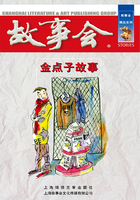I thought of it all only t'other week when things was clearing up ahead; and the last `order' I sent over I set to work and wrote her a long letter, putting all the good news and encouragement I could think of into it.
I thought how that letter would brighten up things at home, and how she'd read it round. I thought of lots of things that a man never gets time to think of while his nose is kept to the grindstone.
And she was dead and in her grave, and I never knowed it."
Mitchell dug his elbow into my ribs and made signs for the matches to light his pipe.
"An' yer never knowed," reflected the Oracle.
"But I always had an idea when there was trouble at home," the digger went on presently, in his quiet, patient tone.
"I always knowed; I always had a kind of feeling that way -- I felt it -- no matter how far I was away. When the youngsters was sick I knowed it, and I expected the letter that come. About a fortnight ago I had a feeling that way when the wife was ill. The very stars out there on the desert by the Boulder Soak seemed to say:
`There's trouble at home. Go home. There's trouble at home.'
But I never dreamed what that trouble was. One night I did make up my mind to start in the morning, but when the morning came I hadn't an excuse, and was ashamed to tell my mates the truth. They might have thought I was going ratty, like a good many go out there." Then he broke off with a sort of laugh, as if it just struck him that we might think he was a bit off his head, or that his talk was getting uncomfortable for us.
"Curious, ain't it?" he said.
"Reminds me of a case I knowed, ----" commenced the Oracle, after a pause.
I could have pitched him overboard; but that was a mistake.
He and the old digger sat on the for'ard hatch half the night yarning, mostly about queer starts, and rum go's, and curious cases the Oracle had knowed, and I think the Oracle did him a lot of good somehow, for he seemed more cheerful in the morning.
We were overcrowded in the steerage, but Mitchell managed to give up his berth to the old digger without letting him know it.
Most of the chaps seemed anxious to make a place at the first table and pass the first helpings of the dishes to the "old cove that had lost his missus."
They all seemed to forget him as we entered the Heads; they had their own troubles to attend to. They were in the shadow of the shame of coming back hard up, and the grins began to grow faint and sickly.
But I didn't forget him. I wish sometimes that I didn't take so much notice of things.
There was no mistaking them -- the little group that stood apart near the end of the wharf, dressed in cheap black. There was the eldest single sister -- thin, pale, and haggard-looking -- that had had all the hard worry in the family till her temper was spoilt, as you could see by the peevish, irritable lines in her face.
She had to be the mother of them all now, and had never known, perhaps, what it was to be a girl or a sweetheart. She gave a hard, mechanical sort of smile when she saw her father, and then stood looking at the boat in a vacant, hopeless sort of way. There was the baby, that he saw now for the first time, crowing and jumping at the sight of the boat coming in; there was the eldest boy, looking awkward and out of place in his new slop-suit of black, shifting round uneasily, and looking anywhere but at his father.
But the little girl was the worst, and a pretty little girl she was, too; she never took her streaming eyes off her father's face the whole time.
You could see that her little heart was bursting, and with pity for him.
They were too far apart to speak to each other as yet. The boat seemed a cruel long long time swinging alongside -- I wished they'd hurry up.
He'd brought his traps up early, and laid 'em on the deck under the rail; he stood very quiet with his hands behind him, looking at his children.
He had a strong, square, workman's face, but I could see his chin and mouth quivering under the stubbly, iron-grey beard, and the lump working in his throat; and one strong hand gripped the other very tight behind, but his eyelids never quivered -- only his eyes seemed to grow more and more sad and lonesome.
These are the sort of long, cruel moments when a man sits or stands very tight and quiet and calm-looking, with his whole past life going whirling through his brain, year after year, and over and over again.
Just as the digger seemed about to speak to them he met the brimming eyes of his little girl turned up to his face.
He looked at her for a moment, and then turned suddenly and went below as if pretending to go down for his things. I noticed that Mitchell -- who hadn't seemed to be noticing anything in particular -- followed him down. When they came on deck again we were right alongside.
"'Ello, Nell!" said the digger to the eldest daughter.
"'Ello, father!" she said, with a sort of gasp, but trying to smile.
"'Ello, Jack, how are you getting on?"
"All right, father," said the boy, brightening up, and seeming greatly relieved.
He looked down at the little girl with a smile that I can't describe, but didn't speak to her. She still stood with quivering chin and mouth and great brimming eyes upturned, full of such pity as I never saw before in a child-face -- pity for him.
"You can get ashore now," said Mitchell; "see, they've got the gangway out aft."
Presently I saw Mitchell with the portmanteau in his hand, and the baby on his arm, steering them away to a quiet corner of the shed at the top of the wharf. The digger had the little girl in his arms, and both hers were round his neck, and her face hidden on his shoulder.
When Mitchell came back, he leant on the rail for a while by my side, as if it was a boundary fence out back, and there was no hurry to break up camp and make a start.
"What did you follow him below that time for, Mitchell?" I asked presently, for want of something better to say.
Mitchell looked at me out of the corners of his eyes.
"I wanted to score a drink!" he said. "I thought he wanted one and wouldn't like to be a Jimmy Woodser."















